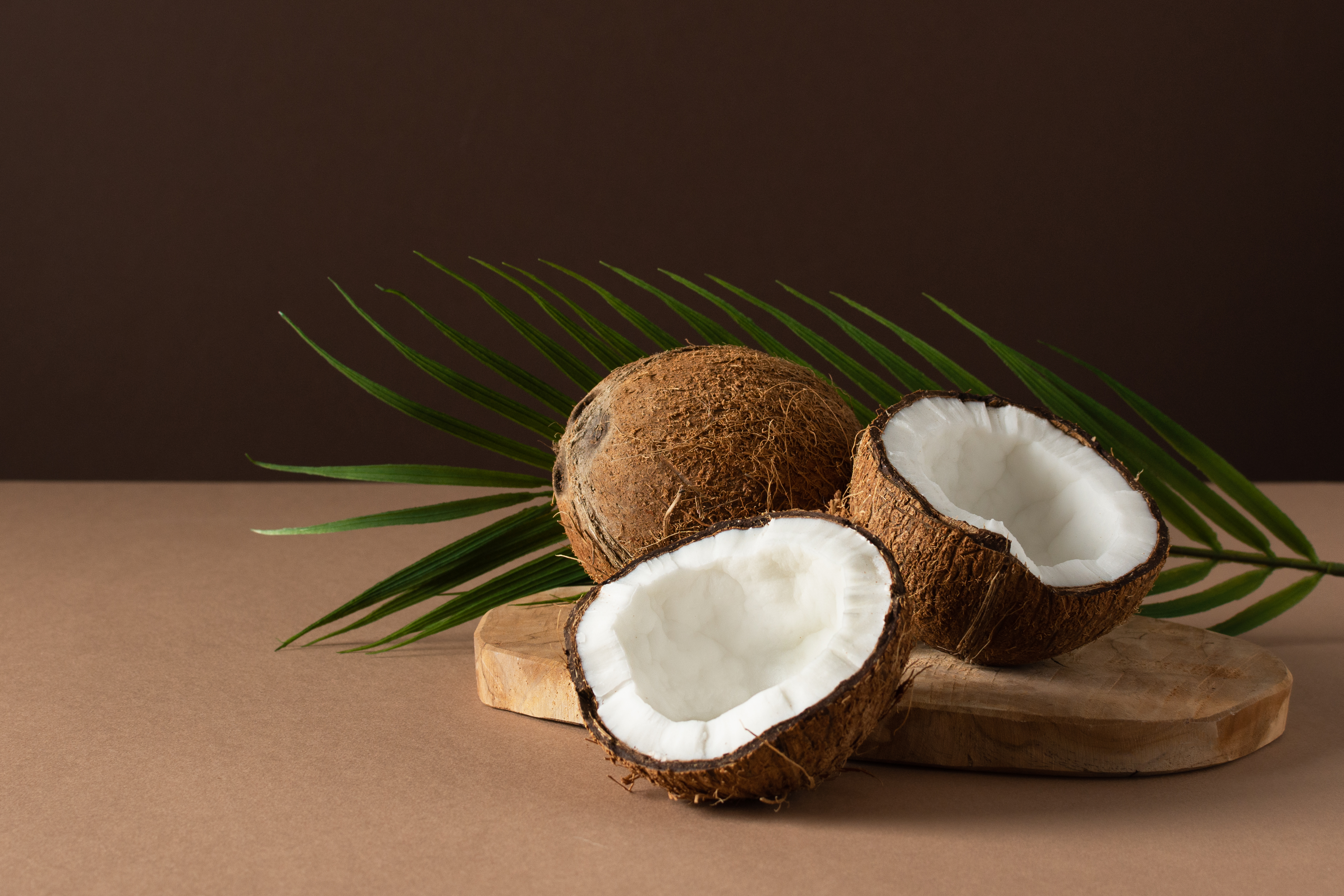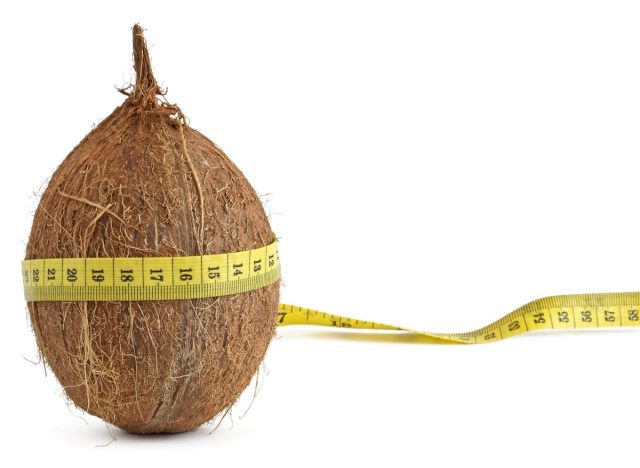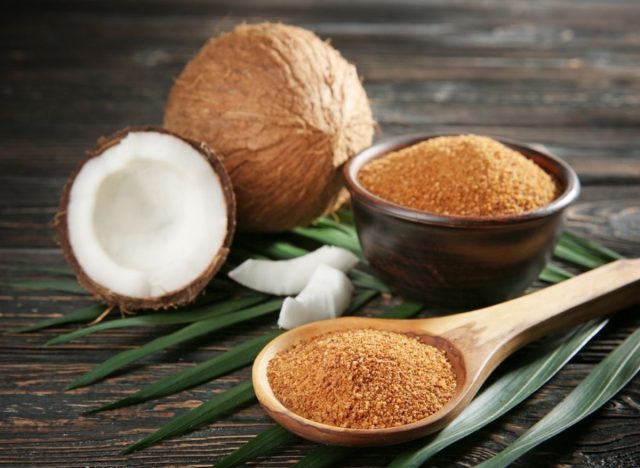Surprising Side Effects of Coconut, Say Dietitians

Just because the coconut is a tropical fruit, doesn’t mean you need to be on a beach to eat it (although it sounds ideal). You can pick it up at almost any grocery store and turn it into so many sweet or savory recipes. You can even drink its water or turn it into milk or oil.
Additionally, are many health benefits to reap when consuming this fruit. However, with all delicious foods, it could also come with precautions. Dietitians Lyssie Lakatos, RDN, CDN, CFT, and Tammy Lakatos Shames, RDN, CDN, CFT, also known as The Nutrition Twins and members of our medical expert board, listed some surprising side effects of coconut to consider before your next purchase. After, for more fun with tropical fruits, check out One Major Effect of Eating Papaya, Says Dietitian.
You may reduce your risk of bone fractures.

“Coconut is a great source of copper, and although most people aren’t truly deficient in copper, some may not get enough,” says The Nutrition Twins.
According to Mount Sinai, copper helps your body make red blood cells and keeps nerve cells and your immune system healthy. It also helps form collagen, a key part of bones and connective tissue. Your body also needs copper to make energy.
Although rare to have a copper deficiency, possible signs include anemia, low body temperature, bone fractures and osteoporosis, low white blood cell count, irregular heartbeat, loss of pigment from the skin, and thyroid problems.
“When you’re low in copper your bone health suffers and eating a lot of coconut will prevent this,” says The Nutrition Twins.
If you’re obese, you may lose weight

The Nutrition Twins suggest that you would have to replace the other saturated fats in your diet with coconut in order to get the benefit of coconut’s medium-chain triglycerides. These fatty acids can potentially promote weight loss by reducing body fat, increasing fullness, and potentially improving your gut environment.
Try swapping out butter for coconut oil, or using shredded coconut on your salad instead of cheese if you’re looking for alternative methods.
You may fight against foodborne illness.

Coconut can help fight against any illness that comes from contaminated food and bacteria. Certain bacteria that can be present include Staphylococcus epidermidis, which can cause wound infections, boils, sinus infections, and other inflammations, and Escherichia coli (E. coli), which can cause severe stomach cramps, often bloody diarrhea, and vomiting.
“Although the research was done in a test tube using coconut oil and water, it seemed protective against the bacteria,” says The Nutrition Twins.
You may become more regular and fight against constipation.

The Nutrition Twins suggest that because the average American only gets 12 grams of fiber a day, when the recommended daily minimum is 25 grams for women and 30 grams for men, coconut can help recommendations to be met.
“A 3.5-ounce serving of coconut provides 9 grams of fiber, so if you’re eating larger quantities, you’ll quickly reach your daily fiber requirement,” they say.
You may gain weight.

“Most people think of coconut as a healthy, plant food, and typically, when people view a food as ‘healthy,’ they don’t think of it as a problem for the waistline,” says The Nutrition Twins.
Coconut is calorie-dense. When it’s cut up into pieces, you can easily consume over 1,400 calories in coconut and not even realize it.
“That’s as much as a small, inactive female should get in her entire day, without any other food added,” say The Nutrition Twins.
They also advise that many plant-based recipes also call for coconut oil, and those recipes are often exceptionally high in fat and calories.
Your cholesterol may go up.

Coconut is high in saturated fat, which plays an important factor when it comes to raising cholesterol levels, especially for those who are genetically affected by saturated fat.
“If coconut oil is your favorite cooking oil, be aware that it’s extremely high in saturated fat, and has 50% more than butter,” say The Nutrition Twins. “So you may want to rethink pouring it liberally. Coconut oil has been shown to raise both bad and good cholesterol.”
Here are the Eating Habits You Must Follow if High Cholesterol Runs in Your Family.
You may help to protect your body against cancer.

According to The Nutrition Twins, coconuts contain the polyphenols gallic acid and caffeic acid, both of which help to protect the body against cancer thanks to their potent antioxidant properties.
The Anti-Cancer Agents in Medicinal Chemistry Journal also shows studies have reported that the fatty acids in coconut oil may have anticancer potential and may trigger cell death in cancer cell lines.
You may get a lot of sugar.

“If your favorite way to eat coconut is in a form that has been processed with sugar, you may unknowingly (or knowingly) be racking in the teaspoons,” say The Nutrition Twins.
When it comes to consuming sugar, women should limit themselves to 6 teaspoons a day, while men should limit their sugar intake to 9 teaspoons a day, according to the American Heart Association.
According to the Nutrition Twins, one cup of sweetened dried coconut typically contains about 10 teaspoons of added sugar—and coconut lovers typically don’t stop at just one cup!
You may help to improve symptoms of Alzheimer’s.

The Nutrition Twins state that although more research is needed, a 2015 review article posted in the British Journal of Nutrition showed the effects of medium-chain triglycerides (MCTs)—a type of fat found in coconuts—on Alzheimer’s patients and found that MCTs helped to make significant cognitive improvements.
Here’s The #1 Best Food for Alzheimer’s.